Protected species of the month - European Medicinal leech
In the month when the World Wetlands Day is celebrated every year, we will get to know the inhabitants of the water - European Medicinal leech.

The European Medicinal leech is a small segmented parasitic worm that inhabits various freshwater habitats and feeds on the blood of other vertebrates, such as fish, amphibians, birds and mammals. The European Medicinal leech lives in lakes, ponds and other waterbodies but in Latvia it is relatively rare and unevenly distributed, although there are enough suitable habitats. Europe is considered to be the center of the species' woorld distribution but with the help of humans, the leech has spread elsewhere, such as in North America and Africa.

Historically, the European Medicinal leech has been used in medical leech therapy. Even today, live Medicinal leeches are still used in plastic surgery and for other healing purposes. The first information about the use of leeches in medicine is known from Ancient India. In the 19th century leeches were used so widely and frequently that it led to the extinction of the species in several Western European countries. Today, the large population of European Medicinal leech remains only as local and small in micropopulations, and in most European countries this is considered an endangered or threatened species.
European Medicinal leech are threatened by the loss of suitable habitats due to drainage, lack of food sources, and the collection of leeches from natural populations for medical purposes.

The Project “Threatened species in Latvia: improved knowledge, capacity, data and awareness” LIFE19 GIE/LV/000857 LIFE FOR SPECIES is implemented with the financial support of the LIFE Programme of the European Union and Latvian State Regional Development Agency. This publication reflects only authors’ view. Neither CINEA (European Climate, Infrastructure and Environment Executive Agency) nor European Commission are responsible of any use that may be made, or the information contained therein.
